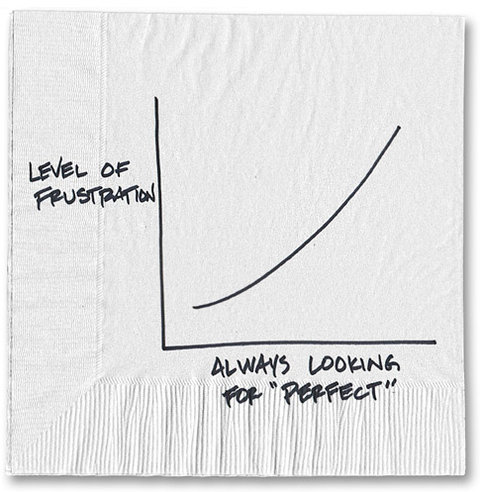 Carl Richards
Carl Richards
Carl Richards is a certified financial planner in Park City, Utah. His new book, “The Behavior Gap,” was published earlier this month. His sketches are archived here on the Bucks blog.
Given the amount of time in each day and the number of resources we have at our disposal, it’s only natural that we have an expectation that we’re going to get the decisions we make about money “perfect.”
Over time, we figure out how much money we should spend and define our financial priorities. But then things change and we have to make another decision, leaving us frustrated.
If we have to keep making the decisions over and over, then what’s the point?
Whether we like it or not, life is not static. We don’t live in bubbles. And even though one day may look very much like another, life is rarely the exact same every week let alone from year to year. Perhaps the basics stay the same — work, school, relationships — but little things change, and we learn to adapt to those changes.
We need to think the same way about money. Even after we make smart decisions life will continue to happen.
The decision to save money each month may need to change if someone loses a job. The decision to have another child may mean that you need to buy a new car sooner than planned. The decision to retire early may be put on hold after a health emergency. In each example, no one did anything wrong; life happened.
The unavoidable reality we face is that few financial decisions are set in stone. At some point, we’ll need to recalibrate, to take into account new circumstances that change our decisions. Too often people get caught up in thinking that this recalibration is a sign they made a mistake. Hardly. They just have a life.
In fact, in many ways, if you aren’t recalibrating your decisions as you go, then you’re likely ignoring decisions that will turn into mistakes and compound over time.
But, even as you look to recalibrate, you can’t ignore that some of these inputs will be outside your control, which takes us back to the idea of making perfect decisions. At any given point, we may make what appears to be a “perfect” decision, but there’s only so much that’s in our control.
It all brings the Serenity Prayer to mind:
God grant me the serenity to accept the things I cannot change; courage to change the things I can; and wisdom to know the difference.
Our goal shouldn’t be to pursue perfection in our decision making, but to get really good at knowing when we need to make a change. It will take practice and likely be something you need to do for the rest of your life.
Article source: http://feeds.nytimes.com/click.phdo?i=966bee683872ca2b86781ca9d29d6fbf
Speak Your Mind
You must be logged in to post a comment.